Hard skills: Definition and their importance in your career
In this article, Aniday will provide an overview of what is hard skills and their importance in boosting your career in the competitive job market. We will also provide you some examples of hard skills in different categories as well as the high-on-demand skills that companies are looking for. Let's start!

The definition of hard skills
Hard skills refer to precise competencies, capacities, and skill sets that an individual can acquire and showcase in a quantifiable manner. These are teachable skills that empower individuals to execute job-related duties or fulfill specific job prerequisites.
When seeking new employees, employers pay close attention to the hard skills detailed in a candidate's resume. While job-specific hard skills are highly valued, proficiency in broader hard skills, such as being fluent in a second language, can also be of significance.
Hard skills pertain to job-specific tasks, like using particular software, tools, or equipment. They are acquired through experience, training, schooling, apprenticeships, online courses, and certifications, which can be showcased by candidates through degrees, licenses, or certifications.
Common hard skills in different fields
There are various types of hard skills since they are skill sets in accordance with specific professions. Aniday provides you some examples of hard skills across different jobs as follows:
Marketing skills
-
Search Engine Optimization (SEO)
-
Content Marketing
-
Data Analysis and Analytics
-
Pay-Per-Click (PPC) Advertising
-
Social Media Advertising
Analytical skills
-
Data Interpretation
-
Statistical Analysis
-
Data Modeling
-
Predictive Analytics
-
Business Intelligence Tools
Finance and audit skills
-
Financial Analysis
-
Risk Assessment
-
Internal Controls
-
Auditing Software Proficiency (e.g., ACL, IDEA)
-
Forensic Accounting
Computer-related hard skills
-
Programming (e.g., Python, Java, C++)
-
Network Administration
-
Cybersecurity
-
Database Management (e.g., SQL)
-
System and Server Administration

Graphic Design skills
-
Adobe Creative Suite Proficiency (e.g., Photoshop, Illustrator, InDesign)
-
Typography and Layout Design
-
Image Editing and Manipulation
-
Color Theory and Composition
-
User Interface (UI) and User Experience (UX) Design
Benefits of Hard Skills
Hard skills are essential in today's job market due to the advantages they offer, such as the following:
Essential for Success
In today's dynamic job market, hard skills are the foundation of professional success. Job listings are meticulous in specifying the hard skills required for each role, often accompanied by preferred qualifications such as academic degrees or certifications, which are seen as prerequisites for even entering the competition.
Better Employment and Career Advancement
Having strong hard skills is crucial for employment and career advancement. Employers often require evidence of specific hard skills as a prerequisite for job consideration. For example, software developers need expertise in programming languages like Java, Python, or C++. Similarly, accountants must have a deep understanding of accounting principles and proficiency with accounting software.
Once you're employed, strong hard skills enable you to climb the corporate ladder and contribute to a company's success by taking on additional responsibilities. Employers value employees who possess the necessary knowledge and abilities to enhance the firm's overall performance.
Enhancing Organizational Value
Developing hard skills can increase your value within your organization. Possessing high-demand talents like data analysis or programming can lead to improved negotiation power for a higher salary or additional benefits.
Moreover, a strong set of hard skills enhances your efficiency and effectiveness at work. For example, as a proficient software developer in a specific programming language, you can complete tasks faster and with fewer errors than those without such expertise.
Staying Competitive in a Shifting Job Market
In an ever-evolving job market, hard skills are your competitive advantage. As the economy and technology progress, there's a constant demand for new talents and knowledge. Keeping up with the latest hard skills positions you to seize new opportunities and effectively address emerging challenges.
For example, if you're a marketer with expertise in social media advertising, you become more valuable to your employer as this field gains prominence. Alongside hard skills, consider enrolling in personality development classes to enhance your soft skills, creating a well-rounded skill set.
Personal Fulfillment
Gaining hard skills can be a source of personal satisfaction. Mastering a challenging skill or solving complex problems brings a profound sense of achievement. This success enhances self-confidence and fuels a continuous desire for personal and professional growth.
How to obtain hard skills
Now you might want to enhance your resume with valuable hard skills? There are numerous affordable ways to acquire these skills:
-
On-the-Job Training and Volunteering: Gain hard skills through on-the-job training or consider volunteering at local organizations to learn new skills.
-
Online Courses: Explore a plethora of free and low-cost online courses on platforms like Udemy, Coursera, Khan Academy, MIT OpenCourseWare, and Google Digital Garage, many of which offer accredited certification programs.
-
Degree Programs: While pursuing a degree can be more time-consuming and expensive, it's a viable option, especially if you're switching careers. Obtaining a second degree or a master's can be a path to acquiring new hard skills.

How to include Hard Skills in your resume
In your resume, create a dedicated "Skills" section near the top, tailored to the industry's requirements. This section should reflect a combination of hard and soft skills outlined in job ads. Additionally, showcase your practical application of these skills in the "Accomplishments" section. In your cover letter, integrate hard skills into your work experiences to demonstrate your suitability for the position.

Some of the high demand hard skills in the job market for your reference:
-
AI.
-
Business and data analytics.
-
Cloud and distributed computing.
-
Data presentation.
-
Digital marketing.
-
Google Analytics.
-
HTML/CSS/Javascript.
-
Middleware and integration software.
-
Project management.
-
Machine learning.
-
Mobile development.
-
Network and information security.
-
Software revision control systems.
-
Structured Query Language (SQL).
-
Statistical analysis and data mining.
-
User interface design.
-
Web architecture and development framework.
Conclusion
In conclusion, hard skills are essential in today's career landscape. They are attainable and readily accessible, providing a competitive edge in a fast-paced world. We hope this article from Aniday has equipped you with a comprehensive understanding of what is hard skills and how to acquire, highlight, and leverage hard skills to propel your career forward.
Aniday's HR Services
Headhunting Service
Find and recruit quality candidates in just 1 week! Supported by 40,000 experienced headhunters in IT, Finance, Marketing… capable of recruiting in any region.
Headhunting Service ➔Employer of Record (EOR) Service
On behalf of your business, we recruit employees and handle payroll without the need to establish a company in markets such as Vietnam, Singapore, Malaysia, India, Indonesia…
Employer of Record (EOR) Service ➔